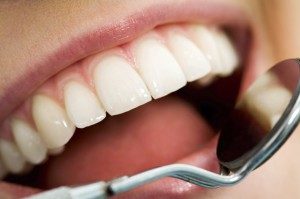Some studies show that over 70% of Americans 65 and older have some form of periodontal disease (gum disease). Periodontal disease is generally painless, and most people are unaware that they have it until a dental examination reveals the condition. Left untreated, it can gradually destroy the bone that supports teeth and result in tooth loss.
Gum disease is often caused by the bacteria found in dental plaque. These bacteria produce toxins or poisons that can irritate the gums. Prolonged irritation may cause the gums to separate from the teeth, creating “pockets” of space between tooth and gum tissue where bacteria thrive. As the disease progresses, the pockets deepen. Eventually, the disease may cause a tooth’s entire support structure to become so weak that the tooth falls out or has to be removed.
Periodontal disease is one of the major causes of tooth loss in adults. Gum disease cannot be cured, but it can be controlled. Professional intervention is necessary to prevent the disease from causing ongoing deterioration. By seeking professional help in a timely manner and maintaining a good home care regimen, patients can achieve the best dental health possible.
Periodontal Disease Risk Factors
Some factors that contribute to the development of gum disease include:
- Genetics – Heredity is a risk factor in about 50% of cases.
- Smoking – Smoking is the #1 behavioral risk factor in periodontal disease.
- Medical conditions – Diabetes is known to increase susceptibility by impairing the immune system.
- Medications – Many medications can have harmful effects on oral health. These include certain heart and anti-seizure medications.
- Stress – Emotional stress may increase risk by depressing the immune system, making it more likely for a bacterial infection to gain foothold.
- Others – Age and poor nutrition can also contribute to periodontal disease. Changes in the levels of female hormones can make women more susceptible at various phases of their lives.
Links between Gum Disease and Other Diseases
Research has linked periodontal disease to other illnesses. While researchers are still unraveling cause and effect, they theorize that oral bacteria enter the bloodstream and travels through the body, causing problems in other areas. Here are some of the findings thus far:
- Link Between Gum Disease and Heart Disease – Researchers found that men suffering from advanced periodontal disease were 4 1/2 times more likely to have coronary artery disease.
- Link Between Gum Disease and Stroke – A study showed that 70% of the fatty deposits found in the carotid arteries of stroke sufferers contained bacteria — 40% of which came from the mouth.
- Link Between Gum Disease and Low Birth-Weight Babies – Research has found that women with untreated periodontal disease had a much greater incidence of low birth-weight babies.
- Link Between Gum Disease and Diabetes – While we’ve long known that diabetics were at increased risk of periodontal disease, new studies have shown that periodontal disease makes it much harder for diabetics to control blood glucose levels.
- Link Between Gum Disease and Respiratory Disease – Dental plaque buildup creates a dangerous source of bacteria that can be inhaled into the lungs. Inhaling bacteria from the mouth and throat can lead to pneumonia.

